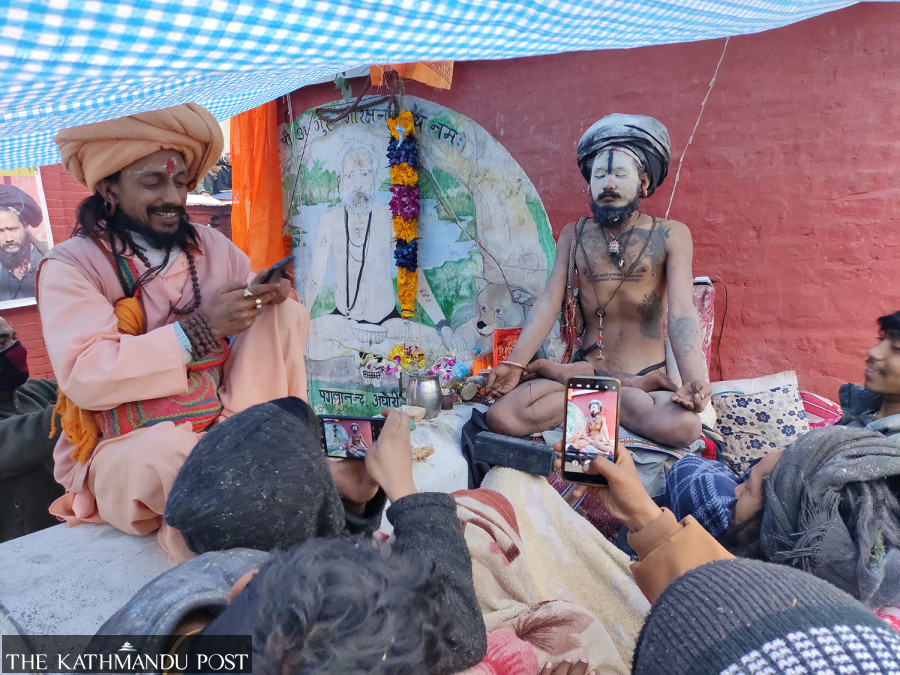National
Nudity in devotion is not obscenity, Nepal Supreme Court rules
Dismisses petition to bar naked sadhus from Pashupati area during Mahashivaratri.
Binod Ghimire
The Supreme Court has refused to bar Naga Sadhus (naked ascetic monks) from entering the Pashupatinath and other Shiva temples, ruling that nudity in the name of religion cannot be regarded as obscene.
Scrapping the writ petition by advocate Yagya Mani Neupane, a division bench of justices Kumar Chudal and Nahakul Subedi clarified that nudity and obscenity are not synonymous.
Petitioner Neupane had sought court intervention to prevent such sadhus from entering the shrines, arguing that acts like roaming naked, smearing ash from the linga (penis) onto people, and performing stunts like lifting stones using the linga spread obscenity and harassed devotees.
“Inviting sadhus from across the border [India] solely to display obscenity in the name of religious festivals results in unnecessary expenditure,” read his petition, referring to the customary arrangements during the annual Mahashivaratri festival by the Pashupati Area Development Trust. “Providing them with Rs3,500 at departure and making arrangements for clothes, food, and lodging has not benefited the country in any way.”
In its verdict, the bench said nudity of such sadhus can not be considered obscene when viewed in the ‘physical, social and religious context’ of tradition. “There is no infringement of any legal rights. Hence, legally, no violation of rights has been found, and therefore, there is no need to issue an order as requested in the writ petition,” reads the full text of the verdict from September 12 last year, released Tuesday. “If they commit some illegal activities, there are already laws to deal with such acts.”
The court has noted that obscenity should be assessed not merely by intentions or motives but by the purpose and context of the act. Citing a 2014 verdict of Calcutta High Court, the division bench has said that whether nudity constitutes obscenity should be judged based on the context in which the act has been done, its purpose, and social acceptability.
“Nudity is simply a physical state, usually referring to the exposure of sexual organs or body parts. However, obscenity means something that arouses sexual desire, or is socially and culturally considered shameful or offensive. Therefore, not all instances of nudity can be considered obscene,” reads the ruling.
“For example, nudity expressed in artistic imagination, for religious purposes, or for medical/therapeutic use, cannot be regarded as obscene. Similarly, ancient sculptures of deities with decorative art in temples, or nude paintings/statues displayed in museums, cannot automatically be labelled as obscene.”
The top court has said the tradition of ascetics (sadhus) and monks sitting on the premises of the Pashupatinath temple to have a darshan [audience with God] of Lord Pashupatinath during Mahashivaratri has long existed.
The celebration of the Mahashivaratri festival is especially important at the Pashupatinath temple. In this context, ascetics and monks often sit naked without wearing any clothing, exposing even private parts of their bodies, in a mark of devotion.
“The tradition of sitting in such a manner has existed from the past until now and must be recognised as a continuing religious practice. Since the tradition of allowing ascetics to enter the premises of Lord Pashupatinath temple during Mahashivaratri has continued since ancient times, prohibiting their entry would violate religious faith at both national and international levels,” the verdict reads.
The court also rejected the petitioner’s claim that providing money, food, and lodging to sadhus was a waste of resources, and said not every act should be assessed in monetary terms.
Every year, hundreds of sadhus, including nagas (naked ones), visit Kathmandu’s Pashupatinath temple and other Shiva shrines during the Mahashivaratri festival, which falls in February or March based on the lunar calendar.
For ages, the Pashupati authorities including the Pashupati Area Development Trust have arranged their food, firewood, and accommodation during the festival. They are bid farewell with some Dakshina (token monetary offering) to cover their travel expenses.




 12.32°C Kathmandu
12.32°C Kathmandu














